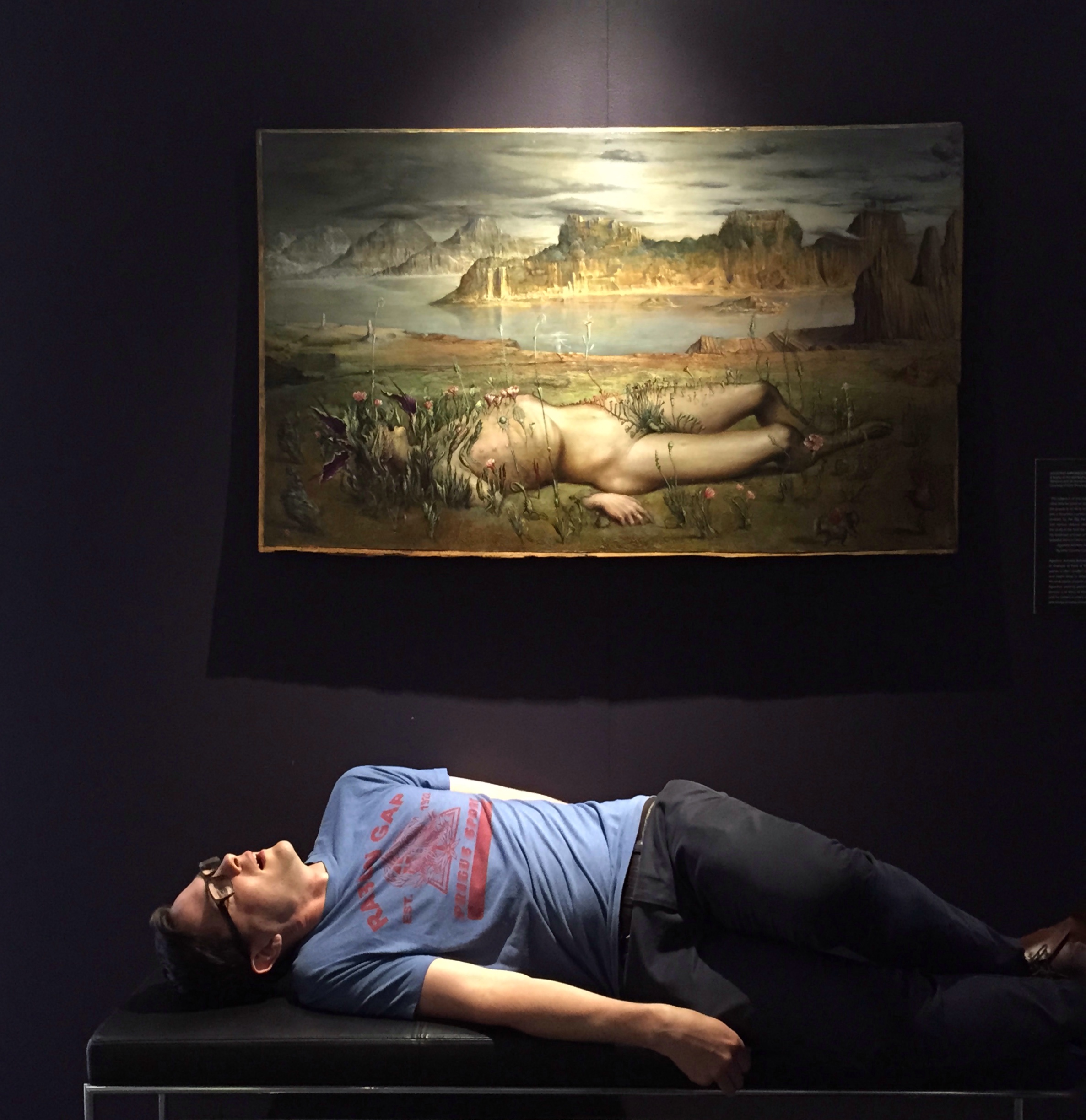NUMU’s New Show Ponders Paradise
by Jeffrey Edalatpour

David below Agostino Arrivabene’s painting
Underneath a blue sky, three shepherds and a shepherdess gambol across the countryside. They sport richly hued Grecian robes of scarlet, ocean and sunflower. En route to nowhere in particular, they encounter a sarcophagus with an inscription carved into its stone edifice: Et in Arcadia Ego.
They look to each other to puzzle through its meaning, “Even in Arcadia, there am I.”
Arcadia, an idyllic place, formed in the imagination, is never real or reachable, except in art. The phrase gives voice to the dead, reminding these carefree souls that even in their particular eden, death is inescapable. But it’s also a message from the painter himself, Nicolas Poussin (1594-1665): “Even in this painting, here am I, my brushwork, my palette, my vision, alive on the canvas 351 years after my death.”
The regenerative power of his painting derives in part from its depiction of the pastoral, but additionally from the visible tension of the living in the presence of the dead. Many artists before and after Poussin have met these ideas squarely, with their paintbrushes in hand. Now, as guest curator, the painter David Molesky has carefully gathered a group of artists—many of them local—conversant with the exhibit title and theme: Et in Arcadia Ego.
Apart from the obvious inspiration from Poussin, there’s a self-portrait, In Arcadia, by the Norwegian painter Odd Nerdrum. He is a spectral figure, a somnambulist, with black pockets of mournful eyes. The painter wanders through a forest glade of lavenders and the deepest of greens. The perspective hovers off-kilter: Nerdrum’s feet may not be touching the ground. The trunk or branch of a tree stretches past his right shoulder out into the air. Either he’s in limbo, the space between the living and the dead, or this is what Scandinavia is like in the twilight hours.
Molesky had access to the painting because he’s a former disciple of Nerdrum’s. For over two years, he painted on his farms in Norway and Iceland. Molesky described Nerdrum as “a figure … like that Balzac statue by Rodin. Odd’s a very imposing figure with a big, square head and his dress smock and a booming voice.” Molesky also describes him as a “grandfather figure who explains his ideas about philosophy and politics in a way that’s completely not didactic.”
Part of that philosophy appears to be the ability of an artist to not only create, but also to tap into a mythology of the self. “You need to go into a dark cave and look for a small dark flame,” Nerdrum told Molesky. “I knew that was my assignment,” Molesky said. In choosing the exhibit’s other works, he’s assembled a gallery full of kindred spirits.
In Agostino Arrivabene’s Il sogno di Asclepio, man and the surrounding landscape are one. Asclepio, a son of Apollo, is dreaming by the shoreline of a lake ringed by mountains. Open-mouthed in mid-snore, he lies naked on his back. With each intake of breath, his body slowly metamorphoses into tendrils, vines and sepals. The dreaming mind of this Salvador Dalí-like figure is the next evolutionary step in the fight against climate change: to harm the natural world is equivalent to causing harm to the self.
Et in Arcadia Ego is an exhibit meant for deliberate contemplation. In fact, there’s a small sign near Preston’s painting that explicates the meaning of the (perhaps self-evident) term “Slow Looking.” As urban development continues to expand its heavy footprint, some of these bucolic scenes simply and beautifully capture a lost era. One long look at Theodore Wores’ Rinconada Hills, Los Gatos from 1922 presents a two-lane horse and buggy path under flowering cherry trees. Are those same hills still abundant with green? An afternoon inside at NUMU may offer summary inspiration to explore the untouched hills that remain, even if it’s unlikely that you’ll stumble upon a sudden, stray sarcophagus etched with Latinate riddles.
